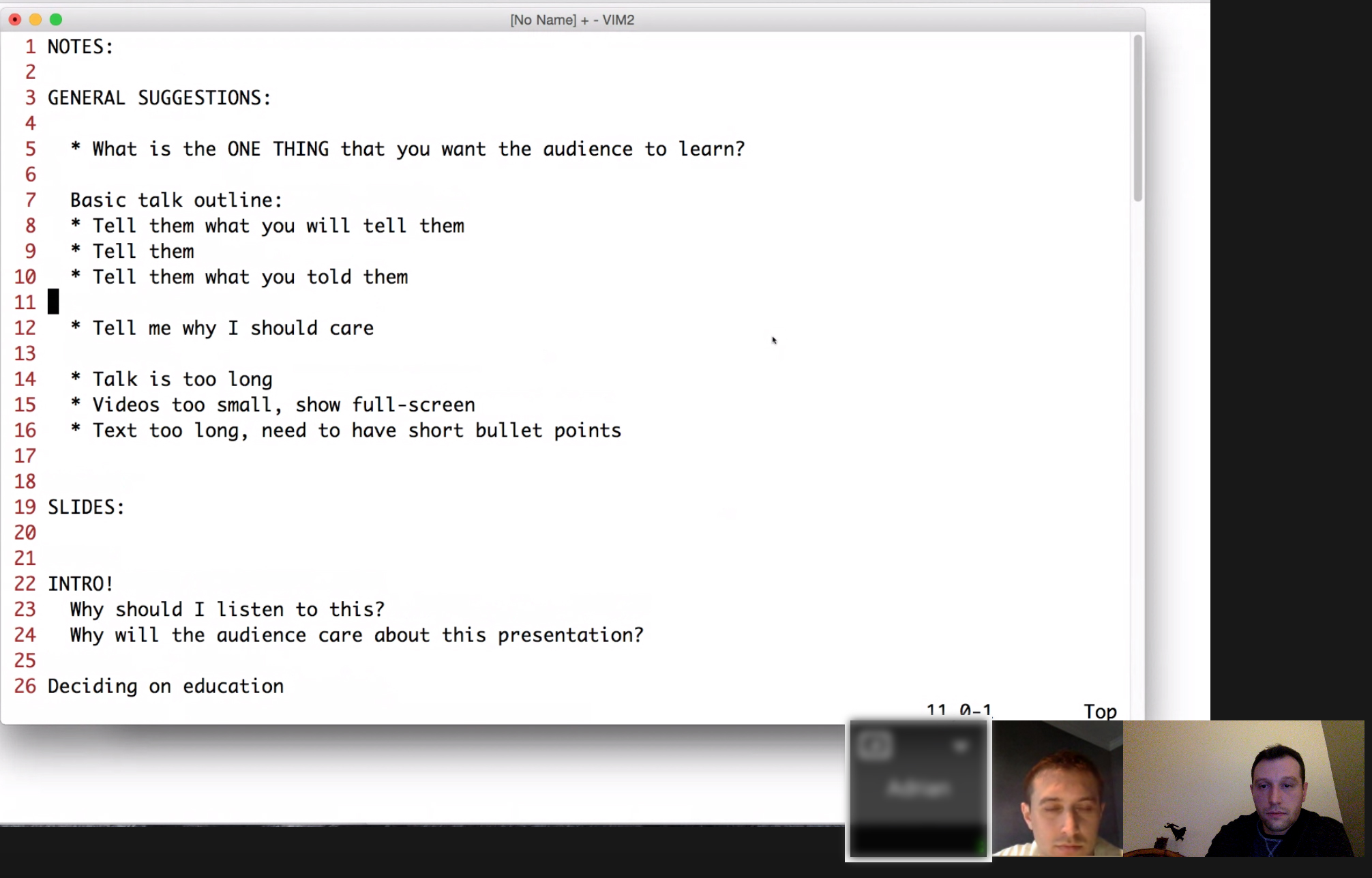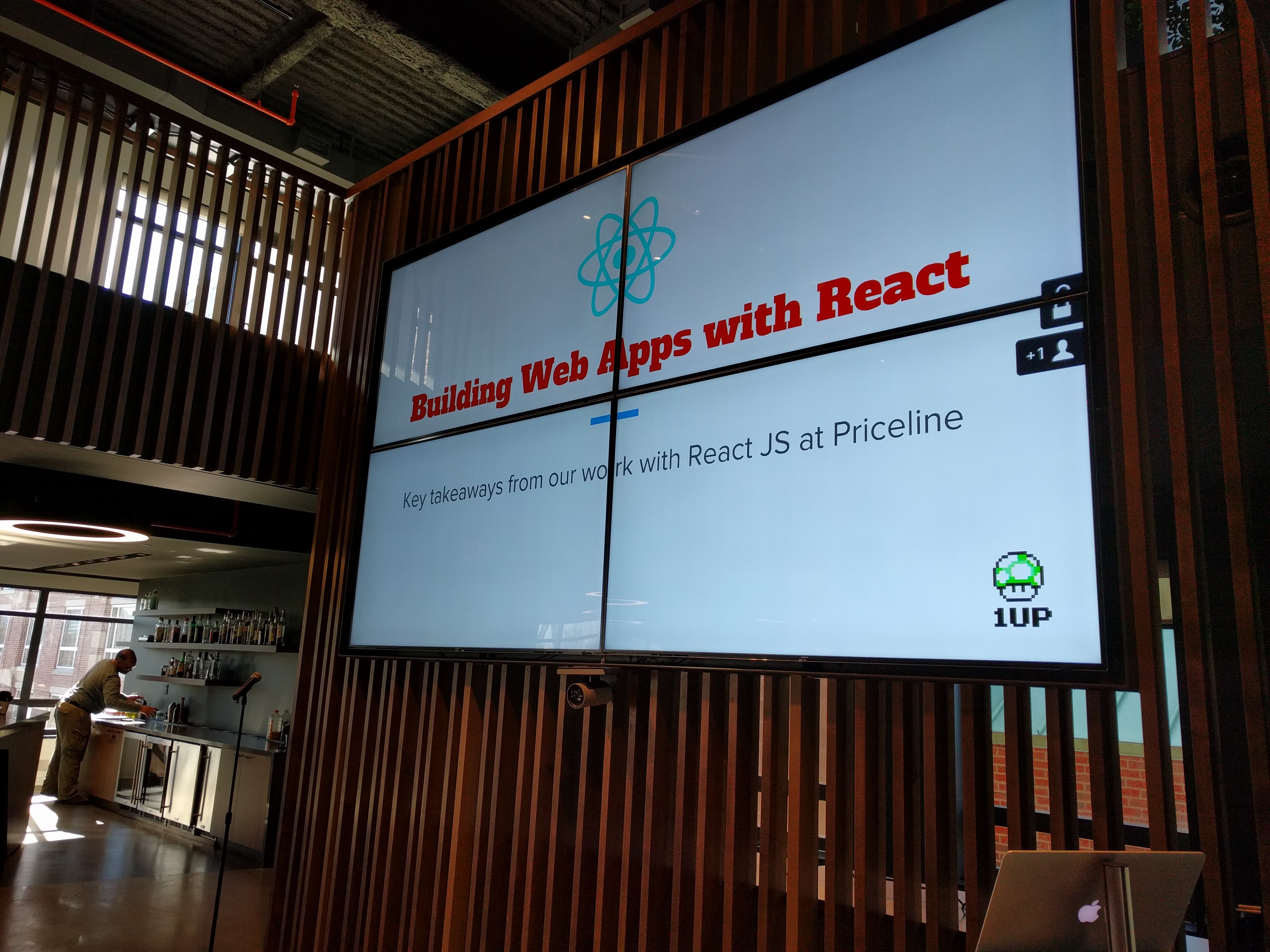Regaining my Grip on Public Speaking

There may come a time when either you yourself would like to share something you have learned. Maybe you have been asked by colleagues or friends to share your topic thoughts with them in a group format. When this starts to happen you are exploring public speaking.
Why I Want to be Great at Giving Tech Talks
I really love what I do. If you read anything about me then you already know that I had a very hard time with getting started in web development. My goal for giving talks is to help others overcome similar challenges that I had faced.
My First Few Tech Talks
I started giving tech talks while working as a Front End Developer. I had been experimenting with Meteor.JS. I privately shared my Meteor Preview hack with a few of my colleagues and they encouraged me to share what I had done with the entire group of developers. I was excited to share what I had learned. So in the weeks leading up to the presentation I prepared a slide deck using CSSS by Lea Verou. I then coordinated with some of my remote colleagues to participate in a live demo.
With everything coordinated and planned, I executed the tech talk and had fun doing it. I answered questions, got a few "ooo's" and "aaah's" - the presentation went well. For this experiment I had felt comfortable with presenting in front of an audience. I imagined I could carry this energy through any talk I would do from now on.
But something changed...
I don't know what happened but it felt that the more talks I did the more anxiety I would experience. Months after my first larger tech demo I was asked to put on a technical presentation during a hackathon at a university in New York. As the days that lead to presentation day passed my anxiety got worse and worse. And during the presentation my anxiety was so intense that I nearly blacked out in front of the audience.
During the talk I had been struggling with myself internally. My inner monologue was in conflict.
Bad Masse: Man, you are about to pass out in front of your peers and all of these people.
Better Masse: No you're not, you're fine... something has to help you through this...
This inner struggle was happening while I had been talking through my slides. I realized that while focusing only on the slides and not looking up at the audience my nerves would begin to calm down. After a few moments of talking at the slide deck I began to gradually calm down and I started to feel more comfortable. Before I knew it I was off script and walking around the room pointing at details on the slides. I closed the session by answering questions and met with students to explain finer details of the presentation or looked over their hacks and provided tips and solutions to some of the things they had been working on.
Later that evening, I had met with my colleagues for a late dinner. During dinner conversation my presentation came up. My colleagues were being very nice but I could not help but to feel a bit embarrassed. For the entire opening of the presentation I had been having a panic attack and I was certain it had showed. When I explained this to the group they were surprised.
Colleagues: You did very well, you looked really comfortable up there...
Me: Huh?
I don't know how I did it, but I managed to fool everyone.
A few weeks had passed when I was asked if I would be willing to participate in a keynote presentation for "The Future of Web Design". I accepted the opportunity but even after giving my answer I felt my heart begin to race, my palms were sweating and anxiety was creeping up on me. I had not even gotten to deciding on my topic and I was already psyching myself out. A few days had passed and someone more product focused ended up getting the keynote. You would think that I would have felt relieved that I had been let off the hook to do this presentation, but I was not. I was not disappointed, it was a great decision, another opportunity will come.
I had not felt jealousy or slighted but I also lacked relief. The anxiety was gone because I did not have to think about presenting.
What the Heck Is Going On?
I know three things:
-
I am experiencing an overwhelming amount of anxiety when I know I have to present something to an audience.
-
The anxiety I am experiencing is not healthy and if I am going to continue with presenting I have to get a grip.
-
I am not going to give up on public speaking.
The very first thing I have to address is the anxiety. It is unhealthy and drastically reduces my performance.
Steps I am Taking to Understand and Combat my Anxiety
1. I talk to everyone about my anxiety.
I am clueless when it comes to coming to terms with inner turmoil. I did the first thing I could think I started talking to anyone willing to listen. I started with my colleagues, friends and even those that had just heard a talk I had given. I would ask:
You know, I experience an overwhelming amount of anxiety during or even thinking about public speaking. I am curious, have you ever felt that way?
And with each person I had gotten very different responses. Just about everyone I spoke with that shared anxiety issues with public speaking would avoid it altogether. These guys did not have much to offer but instead had asked me how I dealt with it. These were great conversations for me because I knew I was not alone and I was able to do something I really enjoy and that is to try to help someone else overcome their challenges.
Some responded with great mental coaching tips, or rituals they would practice to prepare themselves for a public speaking event. One person told me that they that just before they are about to give a presentation they would put their hands behind their back and clench them together as hard as they could. After a few moments of clenching their hands together they would relax and begin speaking. This exercise seemed to help put them at ease.
These conversations were great because when dealing with anxiety it is very personal but while I was talking to others about my angst it feels more like a community issue. My friends and colleagues started to become a support group for me. Sometimes they would check in on my progress, share more tips or something new to try. Working on overcoming my anxiety in this way feels more like dealing with an injury and really gave me hope that I was going to overcome it.
2. Put feedback and tips into practice.
It is important to keep an open mind for the feedback we get from others. I could hear something that sounds like it would never work but if I trust the source enough I at least try their suggestions. I don't wait for a speaking opportunity to try new tactics. One such example was a friend of mine shared with me that people store stress and tension in their stomachs and by forcing your stomach to relax ( Buddha belly was the term they used ), you will feel tension pass and you will begin to relax. In my work I find myself in a lot of meetings. During those meetings I started to check in with my stress level, was my gut tense? When I found that in fact it was, I would practice relaxing and observing how I felt when I did manage to relax.
Now I use the tip of relaxing my stomach during conversations to help me keep an even attitude and make sure that I am listening more than I am talking. This has been extremely helpful while providing someone with coaching or giving feedback. During coaching sessions it is important to present clear, even toned and professional messages to other professionals around me.
3. Working with other professionals that wouldn't go easy on me.
Most of the time when I ask for feedback I ask people that easily tolerate my personality, work ethic and habits. These were great places to start looking for feedback, but not the places where I find the most critical details.
A colleague and I had been preparing a presentation for a MeteorJS Dev Talk. In our outline, we had created over 50 slides of content. Our goal was to share our experience with building a complex application with Meteor JS while also plugging our education platform ClassMate. Before we were allowed to put on our presentation, we had to present in front of the organizers of the event over Google Hangouts. My colleague and I practiced our talk a couple of times to prepare for our preview presentation with the Meteor New York City. We knew we had too much content. We thought we were close to something good and the organizers would simply ask us scale down the amount of information or focus more on one or two things.
The night we presented, I had all of the same symptoms - even with an audience of two. We met with the Dev Shop organizers online and we began our presentation.
About 40 minutes in, the organizer stopped us in our tracks.
My colleague and I presented our content the best we could. We were mostly reading from the speaker notes. At around slide 38 is when one of the organizers lifted his hand to stop us in our tracks. He asked a few simple questions and then provided us with harsh, but the best, feedback we have ever gotten.

What was worse was that over night we developed and rehearsed an entirely new presentation based on the feedback they had provided. We thought
now this is what they wanted, we nailed it.
When we presented our revised presentation the amount of feedback that we received we felt like we failed yet again. Presentation day was the very next evening, and coming up with another presentation before that time felt exhausting. This was the first time I really wanted to step away from something, I felt ill prepared for this. However the DevShop organizers encouraged us to try something new with them, they thought a panel discussion would be something interesting to try and we agreed.
After the dust settled we took a few steps back from what we had experienced. We realized that the feedback we had received was, even though harsh, the feedback that will help us create much better talks in the future. The organizers of the DevShop were just as passionate about us performing well as we were performing. Facing that type of rejection left me with some relief. I was forced to face rejection, which can be scary. But this exercise helped me understand that getting comfortable with rejection will help me overcome anxiety.
Seeing Improvement

Just a few weeks ago I did a talk on the benefits of using React.js at a corporation. The basis of the talk was around why we decided to use the React.js library. Since we had been an Angular.js 1 shop from 2014 to 2016 we needed some good business cases for our decisions to leverage the tool. The audience was a series of corporate front end and back end teams from all over the world.
The stage was set for anxiety to take over, but it did not. Yes I felt nervous, but no panic attacks, I did not feel like I was going to pass out, and my focus was only on my content and the questions that were being asked. Now seeing this type of progress only encourages me to continue by practicing the techniques I have learned from everyone and refining the ones I need to spend more time on.
The Road to Improvement
Follow through has been a critical step. The only way I have improved at anything is by practicing, getting feedback, observing others, making adjustments rinse and repeat. Without taking action I miss out on opportunities for improvement. The alternative is I simply avoid the work, avoid exploration and challenge, but then how would I reach my goals?
